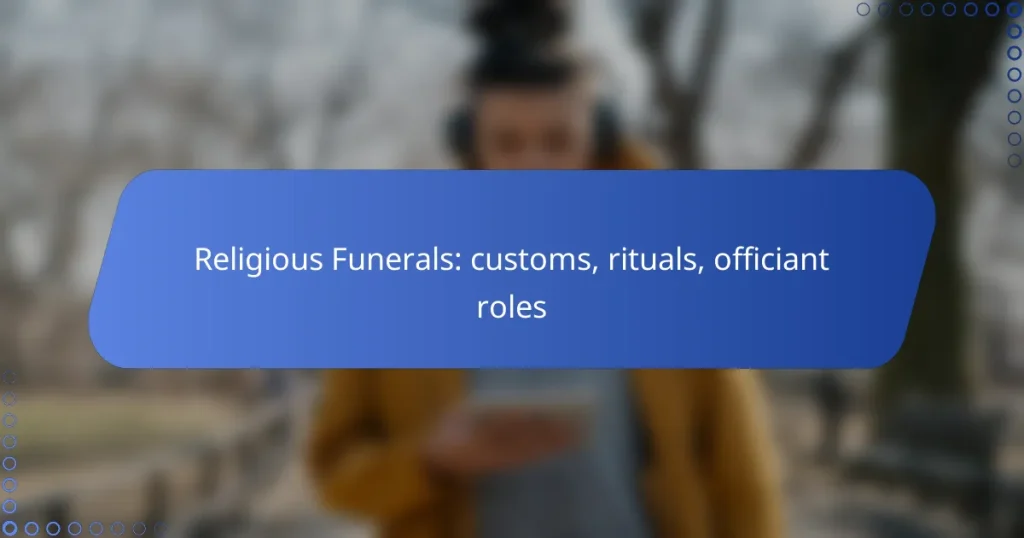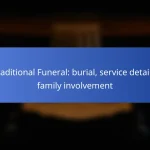Religious funerals encompass a variety of customs and rituals that reflect the beliefs and values of different faiths, particularly in diverse societies like Canada. These ceremonies often involve specific practices, the vital role of officiants, and active participation from the community, all designed to honor the deceased and support those who are grieving.
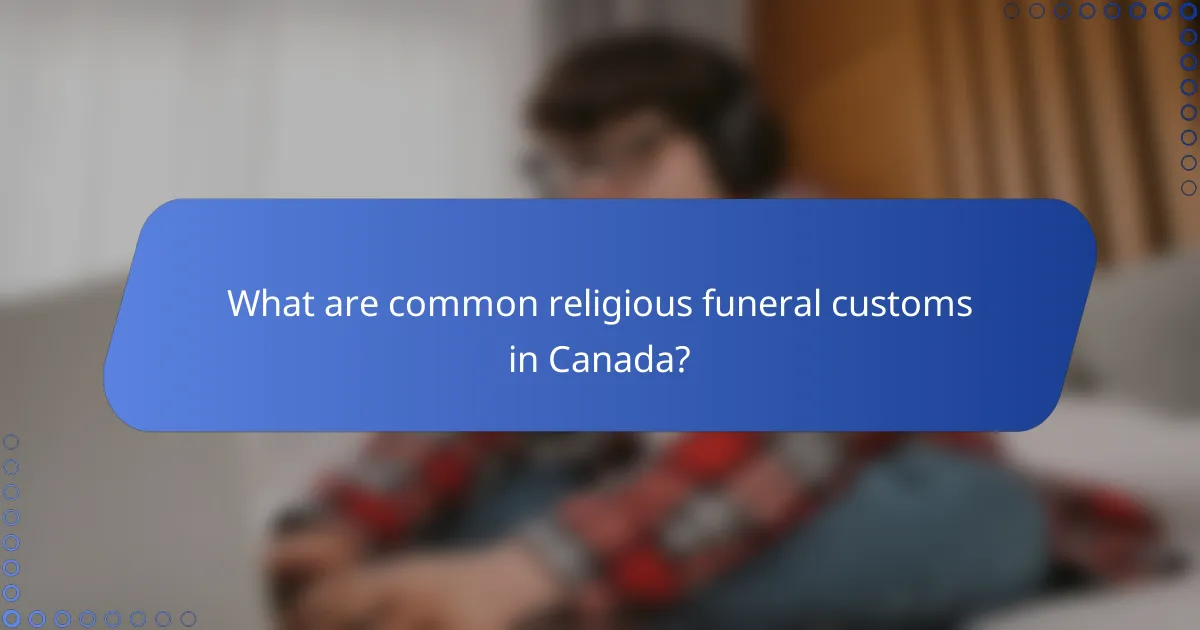
What are common religious funeral customs in Canada?
In Canada, religious funeral customs vary significantly among different faiths, reflecting the diverse cultural landscape. Common practices often include specific rituals, the role of officiants, and community involvement, all aimed at honoring the deceased and providing support to the bereaved.
Christian funeral traditions
Christian funerals typically involve a service held in a church or funeral home, led by a clergy member. The service often includes prayers, hymns, and readings from the Bible, focusing on themes of hope and resurrection.
Burial or cremation is common, with many families choosing to hold a wake or visitation beforehand. It is customary for attendees to offer condolences and support to the family, often bringing food or flowers.
Jewish funeral practices
Jewish funerals emphasize simplicity and respect for the deceased, usually taking place within 24 hours of death. The service is often held at a synagogue or funeral home, led by a rabbi, and includes prayers such as the Kaddish.
Burial is preferred, and mourners may participate in a ritual called “shiva,” where they gather at the home of the deceased for seven days to receive visitors and reflect. It is customary to avoid distractions like entertainment during this period.
Muslim funeral rites
Muslim funerals are marked by a sense of urgency, typically occurring soon after death, often within a day. The funeral prayer, known as “Salat al-Janazah,” is led by an imam and can take place in a mosque or at the gravesite.
Burial is essential, and it is customary for the body to be placed in the grave facing Mecca. Family and friends often gather to offer prayers and support, highlighting the community’s role in the grieving process.
Buddhist funeral ceremonies
Buddhist funerals focus on the impermanence of life and the cycle of rebirth. The ceremonies can vary widely depending on the specific tradition, but they often include chanting, meditation, and offerings to the deceased.
Funeral rites may last several days, with family members participating in rituals that honor the deceased and aid in their journey to the next life. It is common to offer food, incense, and flowers as a sign of respect.
Indigenous funeral customs
Indigenous funeral customs in Canada are diverse, reflecting the various nations and cultures. Many ceremonies involve a connection to the land and community, with practices that may include singing, drumming, and storytelling.
Burial practices can vary, with some communities choosing to bury their loved ones in sacred sites. Rituals often emphasize the importance of honoring the spirit of the deceased and supporting the grieving family through communal gatherings and shared meals.
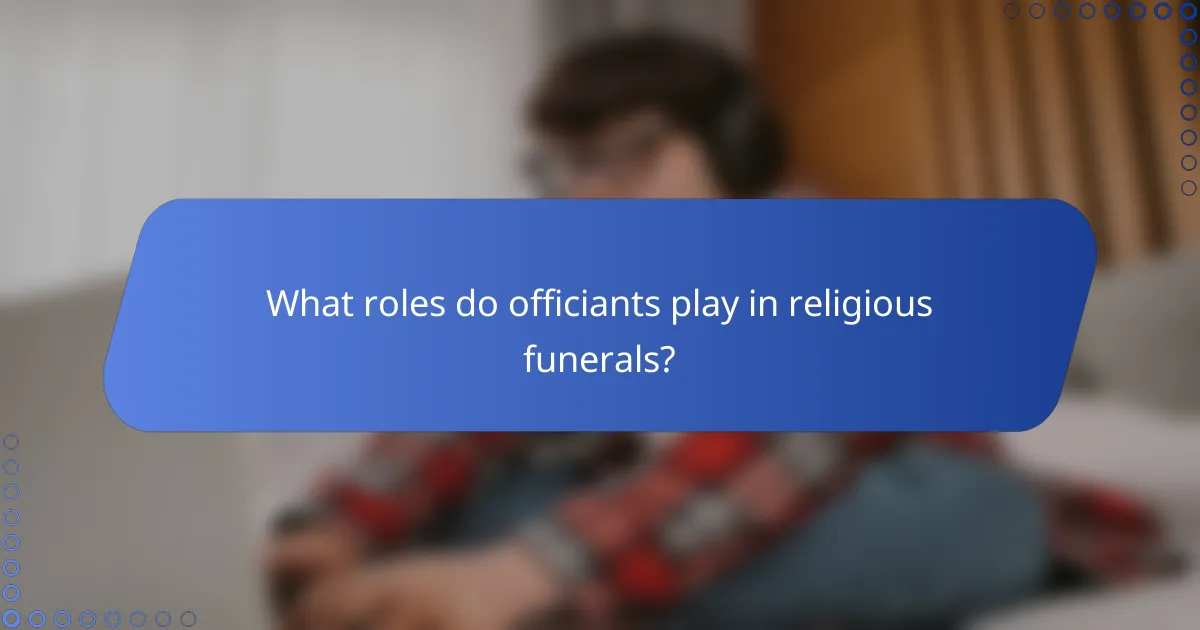
What roles do officiants play in religious funerals?
Officiants in religious funerals serve crucial roles that guide the ceremony and support the grieving family. They can be clergy, laypersons, or funeral directors, each contributing uniquely to the process of honoring the deceased and providing comfort to attendees.
Clergy responsibilities
Clergy members, such as priests, ministers, or rabbis, typically lead the religious aspects of the funeral service. Their responsibilities include conducting prayers, delivering eulogies, and providing spiritual guidance to the bereaved family and friends.
They often incorporate specific rites and rituals that align with their faith traditions, such as readings from sacred texts or the performance of sacraments. This helps create a meaningful experience that reflects the beliefs of the deceased and their family.
Lay officiant duties
Lay officiants, who may not have formal religious training, can also lead funeral services, especially in non-denominational or secular contexts. Their duties often include organizing the service, speaking about the deceased, and facilitating participation from family and friends.
These officiants can personalize the ceremony by sharing stories, memories, and reflections that resonate with attendees. They may also coordinate with clergy if religious elements are desired, ensuring a respectful blend of traditions.
Funeral director’s role
The funeral director plays a vital logistical role in the funeral process, managing the practical aspects of the service. They coordinate with officiants to schedule the ceremony, arrange transportation, and handle the necessary paperwork, including permits and death certificates.
Additionally, funeral directors can assist families in selecting caskets, urns, and other memorial items, providing guidance on options that fit within their budget. They ensure that all elements of the service run smoothly, allowing families to focus on their grief and remembrance.
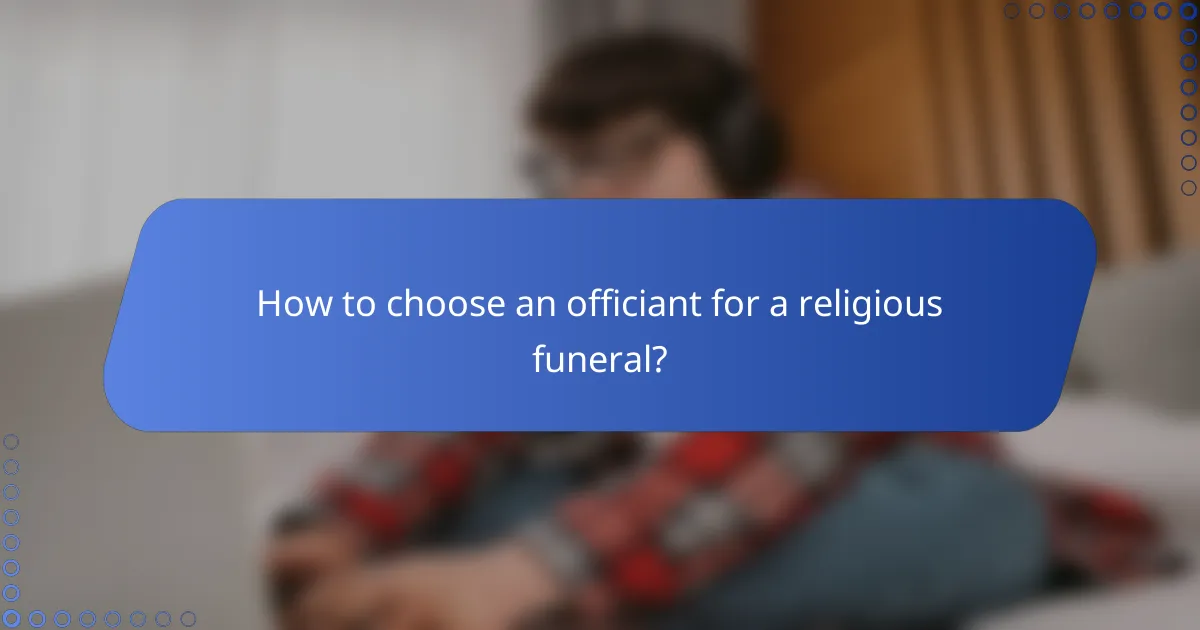
How to choose an officiant for a religious funeral?
Selecting an officiant for a religious funeral is crucial as they guide the service and provide comfort to the bereaved. Consider their experience, religious affiliation, and ability to connect with the family and community.
Criteria for selection
When choosing an officiant, evaluate their familiarity with the specific religious customs and rituals relevant to the deceased’s faith. An officiant should ideally have experience conducting funerals within that tradition, ensuring they respect and uphold the necessary practices.
Additionally, consider their communication skills and empathy. An effective officiant should be able to convey messages of hope and comfort while addressing the emotions of the grieving family. Personal rapport is also important, as a good connection can enhance the overall experience of the service.
Questions to ask potential officiants
Start by asking about their experience with religious funerals, specifically within the relevant faith. Inquire about the number of services they have officiated and their understanding of the associated customs and rituals.
Next, discuss their approach to personalizing the service. Ask how they incorporate the deceased’s life story and the family’s wishes into the ceremony. It’s also wise to confirm their availability and willingness to meet with the family before the service to discuss details.
Lastly, clarify any fees involved. Understanding the officiant’s compensation structure, whether it’s a flat fee or based on donations, can help avoid misunderstandings later on. Aim for transparency to ensure a smooth planning process.
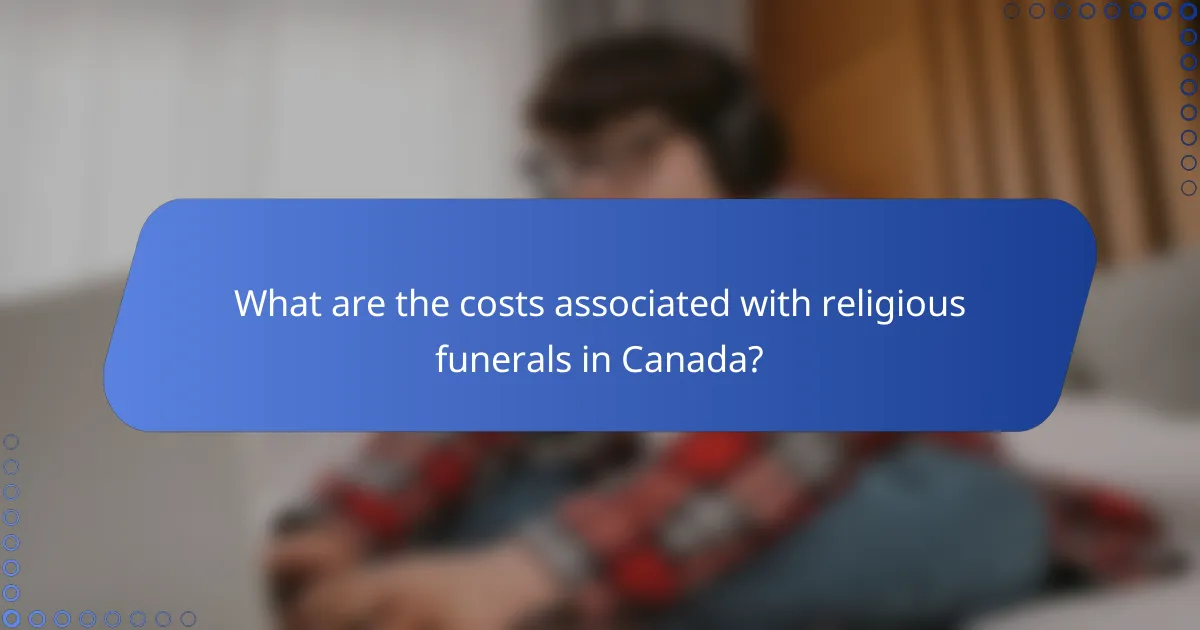
What are the costs associated with religious funerals in Canada?
The costs associated with religious funerals in Canada can vary significantly based on factors such as the type of service, location, and specific religious customs. Generally, families can expect to spend anywhere from a few thousand to over ten thousand Canadian dollars, depending on their choices and requirements.
Average costs for different religions
Religious funerals in Canada often have distinct costs based on the traditions and practices of each faith. For example, a Christian funeral may range from CAD 5,000 to CAD 10,000, including service fees, burial, and other expenses. In contrast, Jewish funerals typically cost between CAD 7,000 and CAD 15,000, reflecting specific rituals such as the use of a simple wooden casket and the presence of a rabbi.
Muslim funerals generally fall within a similar range, often costing between CAD 4,000 and CAD 8,000, depending on burial practices and the involvement of an imam. Other religious ceremonies, such as Hindu or Buddhist funerals, may also vary widely, often influenced by the specific rites and local customs.
Factors affecting funeral pricing
Another important consideration is the level of personalization desired by the family. Customized services, such as unique floral arrangements, specialized music, or elaborate memorials, can add to the overall expense. It’s also essential to account for additional costs like transportation, obituary notices, and reception services, which can further increase the total price.
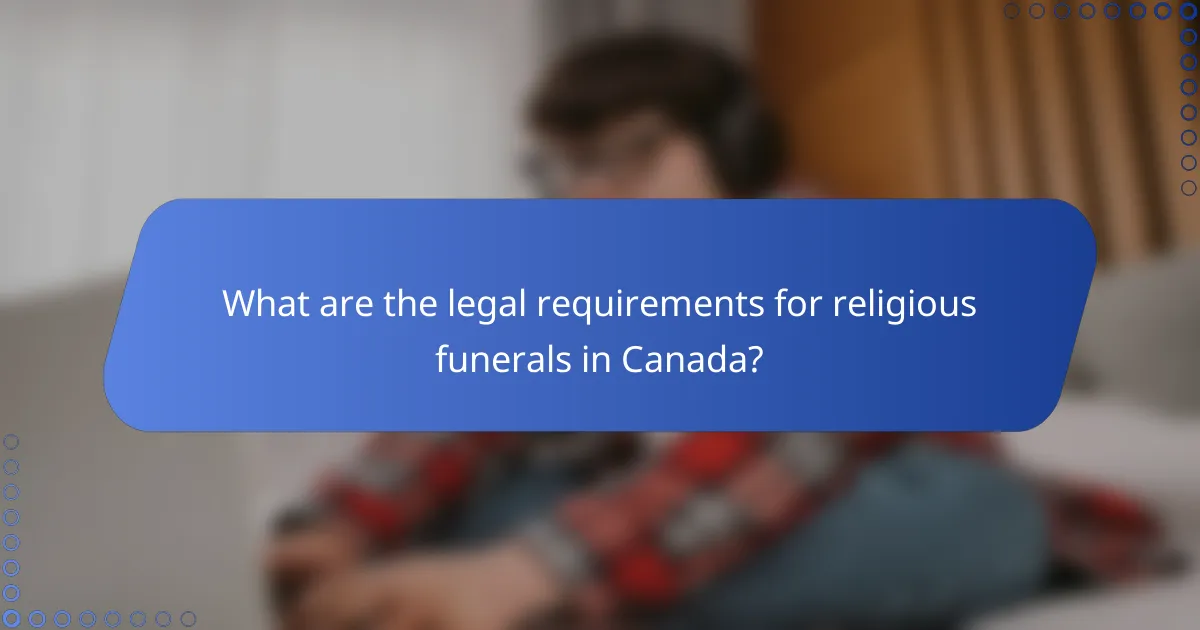
What are the legal requirements for religious funerals in Canada?
In Canada, legal requirements for religious funerals primarily involve permits and adherence to health regulations. Each province may have specific laws governing the handling of remains, burial practices, and the role of officiants, which can vary based on religious traditions.
Permits and documentation
To conduct a religious funeral in Canada, you typically need a burial permit, which is issued by the local government or health authority. This permit is essential for interment and must be obtained before the burial or cremation takes place.
Additionally, you may need to provide documentation such as a death certificate, which confirms the individual’s passing and is usually issued by a medical professional. It’s advisable to check with local authorities for any additional requirements specific to your province or territory.
Health regulations
Health regulations in Canada mandate that deceased individuals be handled in a sanitary manner to prevent the spread of disease. This includes guidelines for embalming, transportation, and storage of the body, which must comply with provincial health standards.
Funeral homes are typically responsible for ensuring these health regulations are met. Families should confirm that the funeral home they choose adheres to all local health codes and has the necessary licenses to operate.
